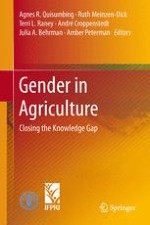2014 | OriginalPaper | Buchkapitel
12. Promoting Gender-Equitable Agricultural Value Chains: Issues, Opportunities, and Next Steps
verfasst von : Deborah Rubin, Cristina Manfre
Erschienen in: Gender in Agriculture
Verlag: Springer Netherlands
Aktivieren Sie unsere intelligente Suche, um passende Fachinhalte oder Patente zu finden.
Wählen Sie Textabschnitte aus um mit Künstlicher Intelligenz passenden Patente zu finden. powered by
Markieren Sie Textabschnitte, um KI-gestützt weitere passende Inhalte zu finden. powered by
